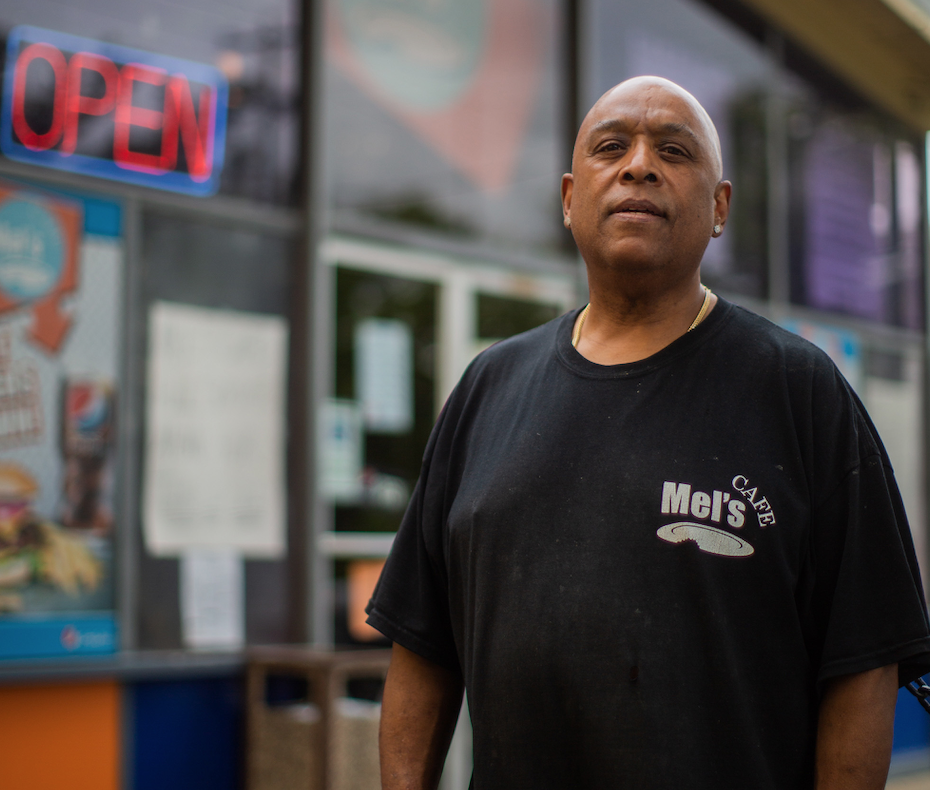Mel Walker wasn’t much for reporters. He was a busy man. When asked to go on the record—about his chicken, one of his trendy new neighbors on West Main Street, or C’ville soul food in general—he’d offer a look that was one part “I don’t have time for that” and two parts “you’ve never written about me before; why now?”
From the other side of the counter at Mel’s Cafe, the folks Walker had time for were his family, his friends, and his diners. Indeed, many of Walker’s regular diners became his friends over the years.
Walker’s death on May 28 due to still-undisclosed causes has brought with it an outpouring of emotion from Charlottesville’s Black community and beyond. It has brought with it a celebration of a legendary local life.
But it has also brought with it many questions about the future of a restaurant that has long stood as both a community gathering place and a symbol of local African Americans’ tenuous hold on their space in a changing cityscape.
“It is a staple for the Black community,” says Tanesha Hudson, a close personal friend of the Walker family who refers to Walker as her “uncle” but is not related to him. “To be there for 39 years, to make it this far not leaning on any type of help from … grants or anything, that is why it is so important. We are fighting for a space in this city. We fight for a space here, and we shouldn’t have to fight. Mel gave us that space.”
The past, the legacy
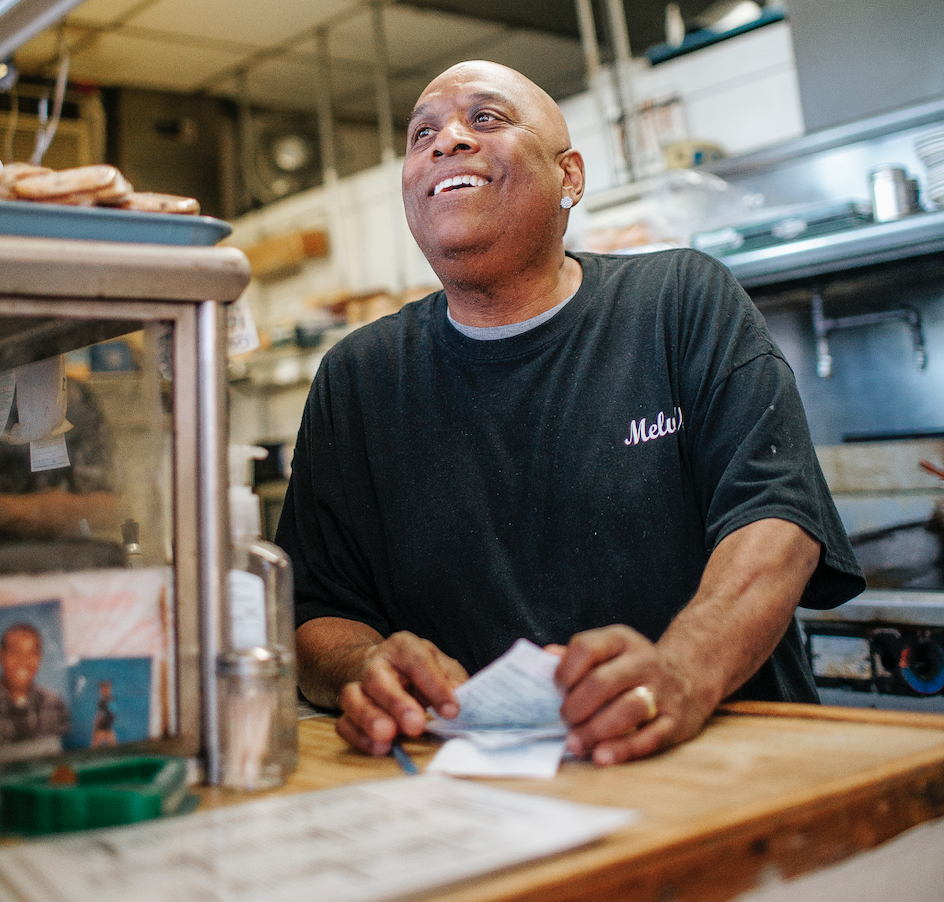
Hudson says Mel’s Cafe is the “only Black business located on Main Street,” and, while it’s not entirely true, it’s close.
According to the United Way of Greater Charlottesville’s 2023-2024 Black Business Guide, five other Black-owned businesses have a West Main Street address: First Baptist Church, Davenport Strategic Innovation, York Property LLC, The Pie Guy, and The Ridley. Additionally, Ty Cooper’s Lifeview Marketing & Visuals is headquartered at 513 East Main.
Another two dozen or so of the 141 Black-owned businesses in the United Way guide are situated within about a mile of Mel’s, but none of them are the type of sit-and-stay-awhile draws that the cafe was. And the volume of Black-owned businesses in the former Vinegar Hill area of town is certainly not what it once was.
“We don’t have much, and what we do have, we want to maintain,” Hudson says. “We are being run out of this city.”
The history of Vinegar Hill has been told and retold, but here it is again: According to the “Brief History of Vinegar Hill” published by Vinegar Hill Magazine, the neighborhood that was bordered on the south by Main Street, home to Mel’s Cafe for nearly four decades, became the economic center for Charlottesville’s Black population in the early 20th century. Segregation was still a way of life, and businesses in the Vinegar Hill neighborhood were a respite for patrons of color.
History suggests the strength of the area helped Black people overcome some of the challenges they faced across the larger City of Charlottesville. Many of them struggled with poor living conditions—including a lack of running water, indoor plumbing, and electricity—but Vinegar Hill was a place to band together, to meet and greet, to discuss problems and plans. Vinegar Hill Magazine says “residents lived and worked among their homes, schools, and churches in a close-knit community, [with] over 55 of the homes and businesses in Vinegar Hill owned by African Americans at that time.”
In 1960, the City of Charlottesville voted to redevelop the Vinegar Hill area. According to Urban Renewal and the End of Black Culture in Charlottesville, Virginia, a book on the area’s oral history, the vote was stacked against Black people.
The book’s authors, James Robert Saunders and Renae Nadine Shackelford, suggest that one of the issues plaguing the neighborhood was the inability of restaurants to stay open. And the balance of the area’s structures, mostly Black-rented residences and a handful of other businesses, had fallen into disrepair.
The neighborhood was razed in 1965. “By the time the demolition part of urban renewal had been completed … 29 businesses had been disrupted,” Saunders and Shackelford write. “They consisted of Black restaurants and grocery stores, as well as furniture stores, barbershops, antique shops, an insurance agency, a clothing store, a shoe repair shop, a drugstore, and a hat-cleaning establishment.”
The city’s highly touted redevelopment project was slow going, though, and it wasn’t until around 20 years later that it gained momentum. A centerpiece was the Omni Hotel, which opened on May 1, 1985, the year after Walker opened Mel’s Cafe at 719 W. Main St.
The man, the food
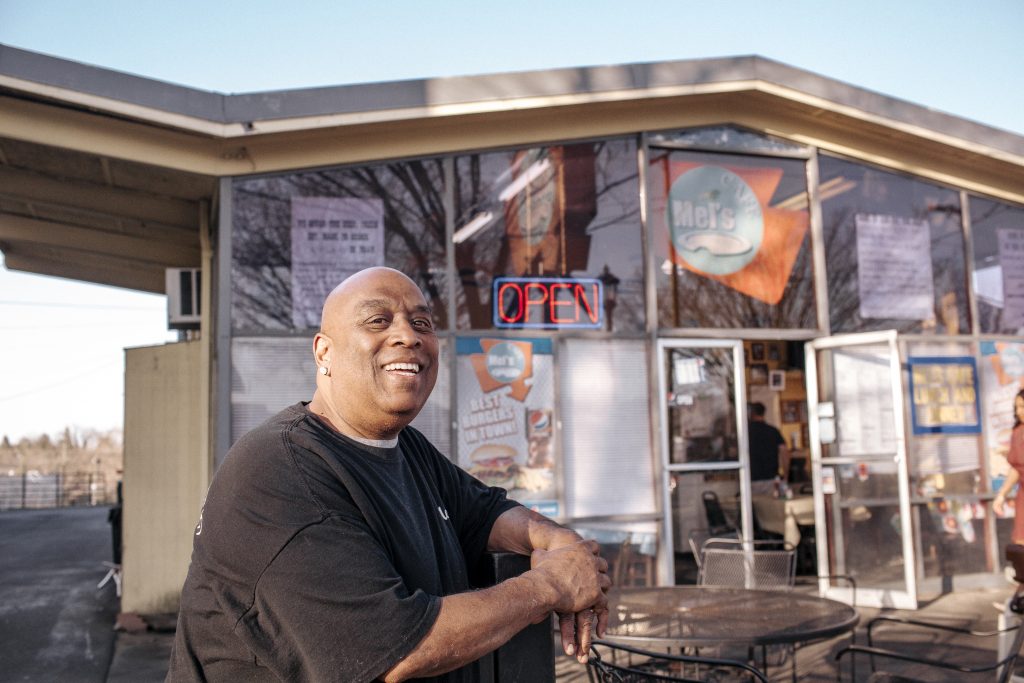
Melvin Walker was born on August 24, 1954. His parents, Marie Walker Scott and Arthur Morrison, lived in Vinegar Hill. According to an obituary first published in the Daily Progress, Walker graduated from Lane High School in 1972. He is survived by his mother, two children, two brothers, and three sisters.
Reports indicate Walker started working in hospitality at a young age, most notably at The Virginian. He opened Mel’s Cafe in 1984 when much of the former Vinegar Hill area remained underdeveloped. The cafe was conceived as a traditional diner, but a slow start made him shut down after several years. He reopened and stayed open in 1995. According to some accounts, Walker initially served beer, wine, and liquor, but the late nights weren’t to his liking, and though he’d remain open for dinner as long as he owned the place, booze came off the menu.
In addition to diner staples like breakfast plates and hamburgers, Walker cooked the cuisine that he knew. Mel’s Cafe quickly came to be known as the top spot for soul food in Charlottesville.
At Mel’s, everyone has their favorite. For Hudson, it’s the hamburger steak with grilled onions, keep the sides coming: extra green beans, mashed potatoes, mac and cheese, pinto beans. Shaun Jenkins, who recently moved his own Soul Food Joint from Market Street to Rio Road, was partial to the fried fish when he moved to C’ville in the early 2000s. “In high school, I ate that a lot,” he says. “That fish sandwich was definitely on point.”
Local top chef Melissa Close-Hart, whose latest project Mockingbird is an homage to her own southern cooking roots, says Mel’s is the ultimate comfort food, just the stuff to eat when you’re feeling down. “It’s a Charlottesville institution, and it is really kind of the only place like that here,” she says. Her Mel’s order? Much like Hudson’s: hamburger steak with gravy and onions, mashed potatoes, green beans, rolls.
For others, Mel’s was the joint for its cooked-to-order fried chicken, Meta’s burger with swiss on rye, or sweet potato pie.
Ask anyone about their favorite dish, though, and they’ll offer a side helping of their own—namely, that Mel’s Cafe was about more than just the food.
Mel’s was about Walker’s mom working the house with a smile and a hug. It was about the regulars discussing events of the day over the low drone of a TV tuned to sports. It was about Walker himself, a quiet, confident type who remembered your name if you came in enough, usually offered a smile, and always reveled in cooking folks a meal with love.
Reverend Alvin Edwards of the Mount Zion First African Baptist Church, located just a few blocks from Mel’s, says he always enjoyed Walker’s cheeseburgers and fried pork chops, but what he’ll remember most is the man’s kindness. “One of the things I could do was, I could ask him to feed a hungry person for us,” Edwards says. “He would run a tab, and sometimes he would call on it, or sometimes he wouldn’t. But he would always make sure the person had a full meal. I was appreciative of his trust.”
Jonathan Coleman, a longtime Charlottesville resident and acclaimed author of multiple books, including Long Way to Go: Black and White in America, developed his own unique relationship with Walker from his regular seat at Mel’s Cafe. While dining on patty melts or fried chicken, the author developed a cross-racial bond with Walker that he cherished.
“The greatest sadness, for me, is that Mel and Mel’s were an essential part of the scaffolding of Charlottesville without a lot of people knowing it,” Coleman says. “For me, Mel’s was so successful not only for the consistency of the food, but for the fact that you could count on the owner being there. It is all part of being recognized as somebody who belongs there. Mel’s gave you that.”
The place, the people
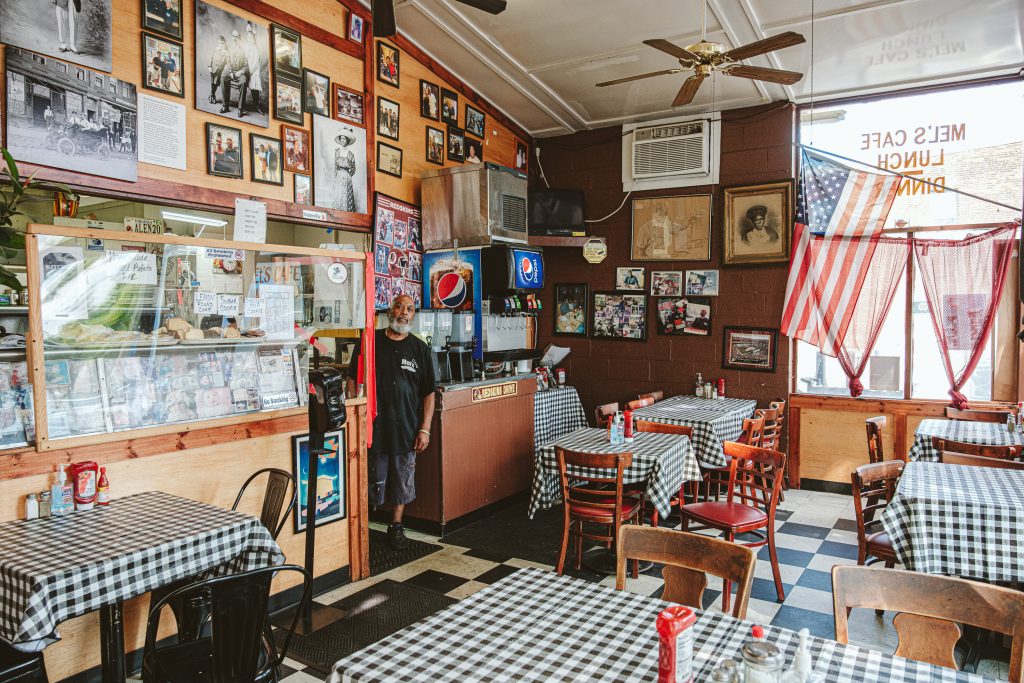
The only thing you couldn’t count on at Mel’s Cafe, according to Edwards, is a seat. “You had to know how to beat the crowd,” he says. “It was just a meeting place, period.”
In the wake of Walker’s death, his family hasn’t answered repeated requests for comment, and for good reason. Hudson says they’re grieving hard; people need time when faced with the unexpected death of a man like Walker.
That hasn’t stopped other folks from talking. On social media, he’s been called “an icon and a pillar in our community that will never be replaced.” In nearly a dozen articles about his passing in various outlets, his friends have told of how much he was loved, how no one ever had anything but good things to say about him, and how he “shared love with the community, no matter who you were.”
Walker’s funeral was held on June 8 at First Baptist Church on Park Street. The restaurateur had been a longtime parishioner at Pilgrim Baptist Church, but the larger space at First Baptist was needed to hold the crowd.
Hudson organized a block party outside Mel’s Cafe after the funeral. It, too, was flooded with attendees. “The community just came out to show love. That is what it is about,” Hudson says. “I’m not surprised at all that it turned out the way it did, because Mel has done so much for so many people.”
Coleman says Mel’s Cafe just worked as a place to sit, talk, and share a meal. He and Walker bonded over Motown music, he says, but The Temptations rarely played in the diner. “Some places don’t lend themselves to constantly playing music,” Coleman says. “I always had mixed feelings in that I wished that I saw more white people in there. That is not necessarily what Mel cared about one way or another, but the idealistic part of me always wished that more people would see it as a gathering spot through the medium of food and conversation.”
Jenkins, who as a young person didn’t get to know Walker over his fish sandwiches, says that even if you didn’t go to Mel’s, you knew who the restaurant owner was. You knew of his impact on the community. “He will never be forgotten,” Jenkins says.
The community, the future
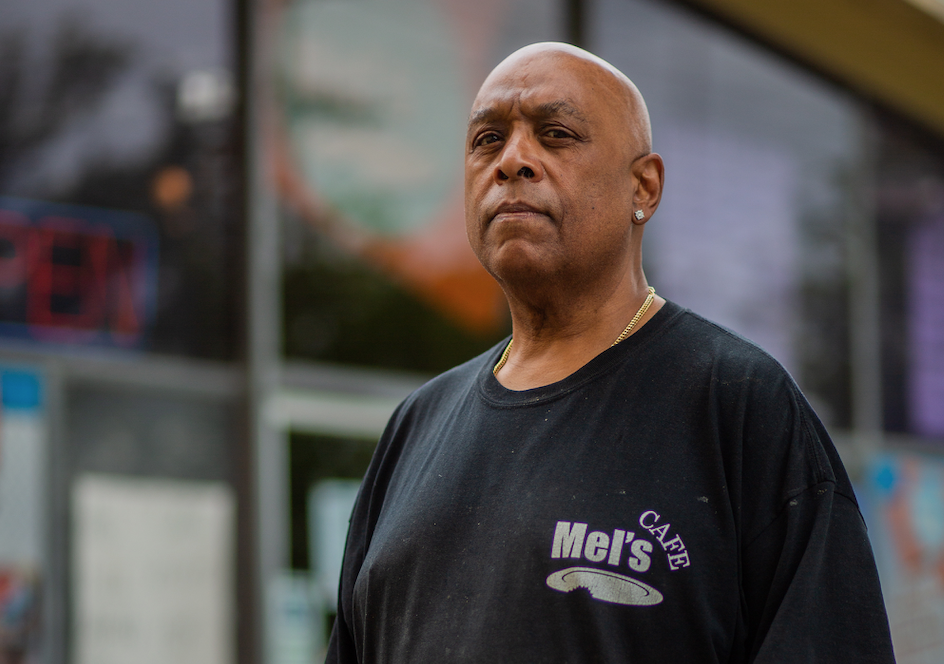
Walker’s family has made it clear, despite avoiding the spotlight: They want to keep Mel’s open. The restaurant is posted as closed until further notice, but an online fundraiser titled “Help Keep Mel’s Cafe Open” is doing well. As of June 17, 140 donors had given $9,788 to the campaign.
One concern for continuing the legacy is the lack of Walker’s own outsized personage. Coleman notes that many mom-and-pops like Mel’s Cafe struggle after they lose their founder, their heart and soul.
Hudson refutes previous reports that she said the restaurant would definitely reopen, but she bristles at the suggestion that Mel’s couldn’t go on without Walker.
“I really don’t want to think about it like that,” she says. “The family has to make that decision. I would think that because it is such a cornerstone, after they deal with the grief, it will reopen. Mel has children. He has family, and his family knows the restaurant.”
None of Walker’s children, nor his mother, could be reached for comment. His oldest son, 19-year-old Emoni Brock, is listed as organizer on the GoFundMe.
Another option for the future of the diner would be to find a buyer. Close-Hart, who’s always wanted to run a restaurant called Mel’s, says she has too much going already. Jenkins says he’s thought about some possibilities, as well, but doesn’t want to offend the Walker family.
“I’m not doing too much investigating or searching. I’m leaving it up to God,” Jenkins says. “People got to keep on pushing forward, and I hope someone is able to step up and keep it rolling.”
Williams, too, says he hopes for the best. But, like Coleman, he wonders whether anyone is in position to carry on Walker’s legacy.
Hudson thinks of Mel’s Cafe as an imperative.
“When you have someone work so hard to maintain Black space in this city, you hope and pray someone wants to maintain it and hold onto it,” she says.
